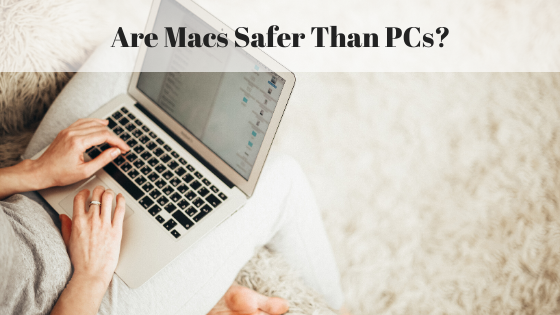Are Macs Safer Than PCs?

Branding is everything. Apple computers have a brand reputation for being luxury items; they’re supposed to be easier to use, better for artists, and safer to use than the many other Personal Computer (PC) brands out there.
While there is a kernel of truth in some claims, it’s best to know why certain reputations exist–if for no other reason than to prove it for yourself. When it comes to safety, blind trust in brands is dangerous.
If you’ve ever heard that Apple’s Mac computers are safer, it’s time to understand more about tech safety. Here are a few details to help you understand the claim, and ways to stay safer no matter your final opinion.
Are Macs Truly Safer Than PCs?
To tackle the claim first, no, there is nothing inherent about Mac computers that make them safer than all other personal computers.
The Apple OSX, much like Microsoft’s Windows operating systems (OS), has its share of benefits and flaws. While there are times when a true victor can claim superiority over another, as of 2020, there is no clear victory when it comes to safety.
What Does Safe Even Mean?
When you ask someone about safety, what are you actually asking about? Most people would assume safety from viruses, being hacked, or other digital compromises. While those topics and more are important, they’re completely different subjects.
For most people, staying safe against viruses is key. To understand your risks, you need to know how and why the most infectious, devastating viruses exist.
Most viruses that cause modern threats are made for the mass market. They need to attack as many systems as quickly as possible, meaning they need to attack the biggest market shares.
Viruses are programs made of code, and code needs to be written for specific systems. These days, if you’re a programmer of any type, you’re writing for more than just Microsoft or Apple.
Viruses can be purpose-built to launch on almost any major operating system, and instead target what most people use on any OS — browsers and popular applications. Writing to attack Chrome, Firefox, Internet Explorer, and Opera is easier.
The same goes for mobile devices. While Android and IOS are different systems, they both have browsers that operate similarly. Even if a hacker wants to target a specific mobile OS, they could still succeed by also writing for browsers.
Whether the virus exists to do damage to files or spy on you to steal personal information (credit card details, names, addresses, passwords, etc.), it’s all easier by attacking common, popular systems.
Where Did The Mac Safety Rumor Come From?
Mac’s initial safety rumors aren’t from better security code or better attention to cyber defense. Even if Apple had a monopoly over security at some point, it’s too easy to reverse-engineer code and do the same thing with another system.
The security comes from lower participation. Apple computers cost more, and up until the popularity of IOS devices, Microsoft’s Windows was the most popular system on the market.
If you want to get more victims, you go for what’s popular. In the 1990s and early 2000s, there were more Windows users, and it was hard to write innovative, devastating code for drastically different systems.
Today, more people use not just Mac, but multiple systems at the same time for work and home. Code is also becoming more uniform, and with the rise of app markets bringing more amateur coders to the market, there are easier ways to sneak in bad code.
To learn more about modern security risks for Apple products, contact a cybersecurity expert.
To the question in your title, my Magic 8-Ball says:
Hi! I'm a bot, and this answer was posted automatically. Check this post out for more information.